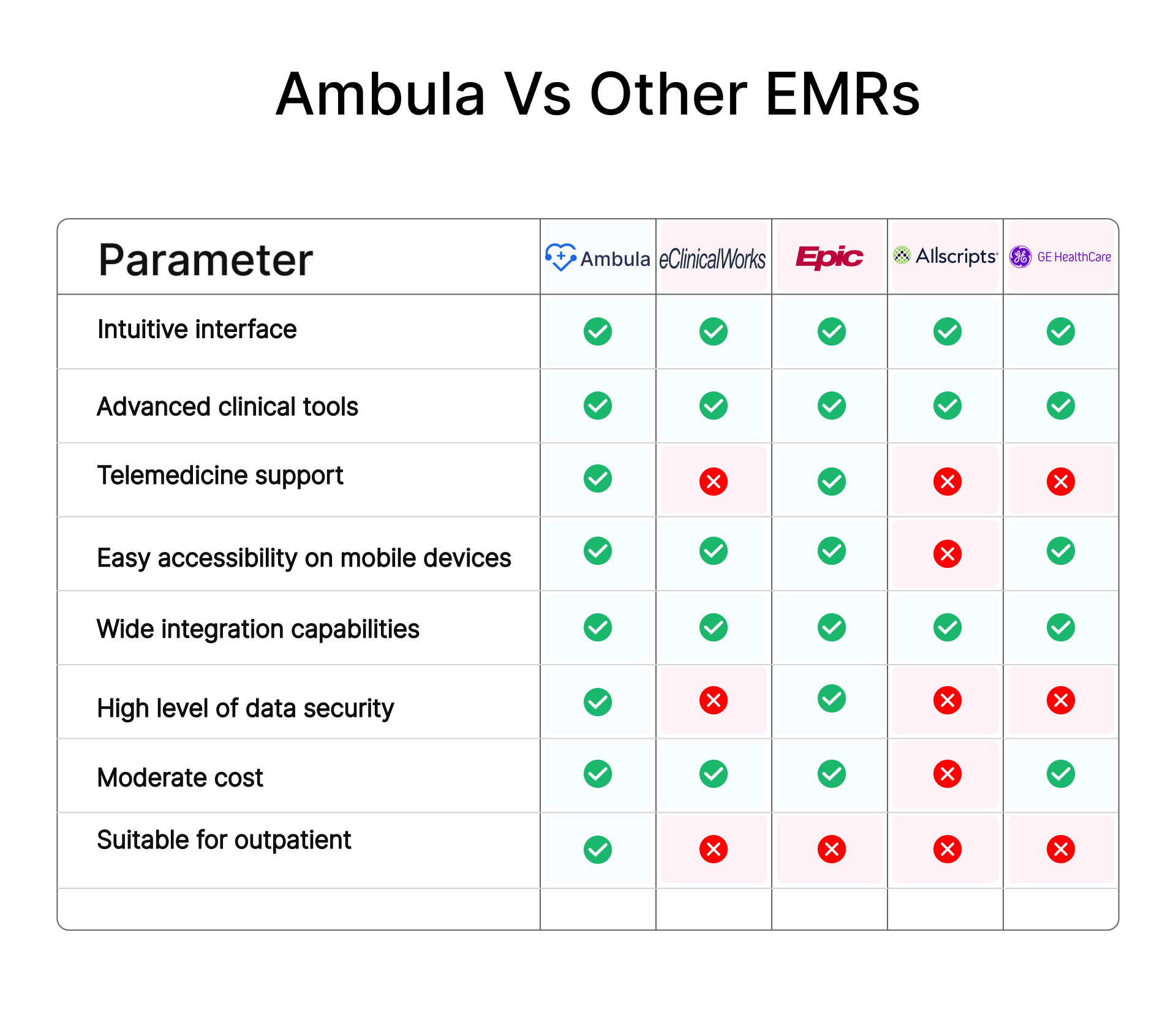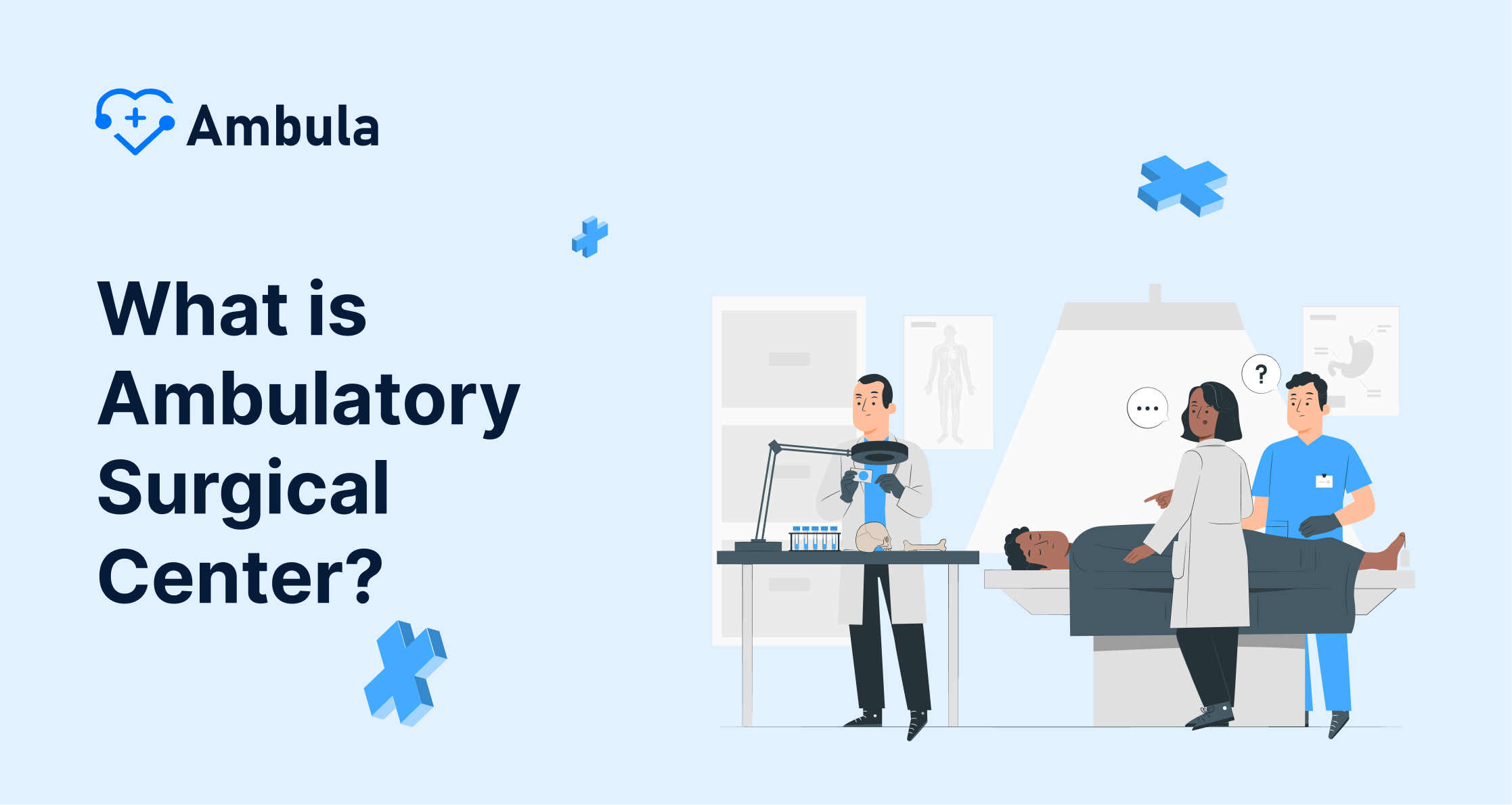How much does it cost to open a surgery center?
Many things go into calculating the cost of opening a surgery center. First, One must identify the important factors and the major expenses involved in building an ASC from scratch.
Topics:
- What is an Ambulatory Surgical Center?
- Cost Break Down
- EMRs for ASCs
- Buying surgery centers or building one
- Why Choose Ambula?
What is an Ambulatory Surgical Center?
Before one can unpack the important factors and expenses that go into opening a surgical center, it would first be helpful to identify what exactly is Ambulatory Surgical Center (ASC) is and why these medical practices are the future of medicine. Briefly, an ASC is a same-day center for surgeries. These specialized medical facilities offer outpatient surgical care. This means patients can go home on the same day they receive a specific medical procedure without being formally admitted into a hospital. In short, the main benefits of an ASC include:
- Fewer costs: no more overnight hospital stays = a smaller bill at the end of the day.
- Advanced care and faster procedures: All surgical procedures are done within one day.
- Fewer complications: less post-surgical pain and fewer rates of infections.
- Community-centered: ASCs serve their community by offering affordable services. These practices are often patient-centered, with less distracted staff and more focused on individual needs.
- Better quality of care: Enhanced quality of care and patient safety comes first.
The Preliminary Steps to Opening a Surgical Center
Opening a surgical center is a major undertaking, but it can be a rewarding one. By following these preliminary steps, you can increase your chances of success:
Research the market
- Conduct a market analysis to identify the need for a surgical center in your area.
- Consider the types of surgeries in high demand and the competition you will face.
- Research the demographics of your target population and their insurance coverage.
Develop a business plan
- Your business plan should include your goals, strategies, and financial projections.
- Identify your target market, services, and competitive advantage.
- Develop a marketing plan to reach your target customers.
- Create a financial plan that includes your startup costs, operating expenses, and revenue projections.
Obtain the necessary licenses and permits
- The requirements vary by state, so research the specific requirements in your area.
- You typically need a license from your state’s Department of Health or Human Services.
- You may also need to obtain additional permits from your city or county.
Secure funding
- Startup costs for a surgical center can be significant, so you must secure funding from various sources.
- Options include personal savings, loans, and investors.
Assemble a team of qualified professionals
- You must hire a team of qualified surgeons, nurses, and other healthcare professionals.
- Be sure to conduct thorough background checks and reference checks on all potential employees.
Develop policies and procedures
- You must develop written policies and procedures for your surgical center’s operations.
- This includes policies for patient care, infection control, and emergency preparedness.
Market your surgical center
- Once you have all the necessary licenses and permits, you can begin marketing your surgical center to potential patients.
- Develop a strong online presence and create marketing materials highlighting your unique selling proposition.
Cost to Open a Surgery Center Breakdown
Regarding cost, four significant expenses are involved in building an ambulatory surgical center from scratch, including land acquisition, site development, design, and construction.
- Land acquisition – One of the most important factors one should take into consideration surrounding the creation of an ASC is land acquisition. Real estate costs vary widely depending on geographical location, urban proximity, and site conditions. The average ASC parcel costs about $800,000 to $1.2 million.
- Site development – Aside from land acquisition, opening an ASC requires calculating site development costs. For instance, the site prep of a decent parcel (including routine grading, paving, and landscaping) will cost an average of $3 per square foot in the south-central United States. Whereas the average cost in the central and Midwest states is $4 and $6 or more in the northern coastal regions for a 20,000-square-foot facility.
- Design – Typically, the cost of architectural and engineering services ranges from about 7 percent to 10.5 percent of construction costs, depending on the scope of services and the degree of architectural involvement.
- Construction – Besides everything else, construction fees play a large role in overall ASC development costs. These fees often vary according to two factors: Location and size. As mentioned, construction costs tend to increase as you move from the south-central United States toward the northeast. Also, the more urban a project setting, the higher the costs. In general, the bigger the facility, the lower the construction cost per square foot.
With all of these factors taken into consideration, it can be estimated that a small, single-specialty ASC with approximately two surgical suites can cost anywhere from $2 million to $3 million, while larger, multi-specialty ASCs can cost anywhere between $4 million and $8 million. However, as was previously discussed, the scope differences, market conditions, and variations in the factors above can cause costs to vary significantly. The cost to open a surgery center does not stop at building it.
Tech Cost of a Surgery Center
Besides the costs that surround the external structures of ASCs and their development, many important aspects go into creating the internal structure of an ambulatory surgical center. To ensure a successful practice, one must undeniably include acquiring an EMR (electronic medical records) system for one’s ASC. This technological tool is key if you’re looking for efficiency and fewer costs. EMRs such as Ambula help ASCs store outpatient medical records and files in an organized manner and electronically structure an office’s workflow. This is important because with the many moving parts of operating an ASC, getting slowed down by paper is not something you’d want to start off as. Pricing for an EMR can vary from $1k a month to $10k a month, depending on the size and so on. If you’re needing an affordable solution, check out our pricing here.
Financial Resources and Funding Options
Establishing your own surgical center can be quite an uppercase commitment, and you’re likely pondering over the question of finances. There are multiple avenues to secure the requisite funding for launching your venture.
Using Your Savings to Fund Your Surgical Center
Starting with your savings represents the most straightforward method of capital investment. However, dipping into your reserves is a significant decision and should be done carefully, considering possible risks. Setting up a surgical center is a substantial undertaking; it would be prudent not to exhaust all your financial resources.
Obtaining Loans for Your Surgical Center
Let’s discuss loans. There are various loan options available to healthcare professionals, such as medical practice loans and small business loans. These could be sought from traditional banks or credit unions. Some institutions even offer specialized healthcare business loans with reasonable rates. You could select a short-term loan for purchasing surgical equipment or a long-term loan for property needs, being mindful of interest rates and repayment terms.
Approaching Investors to Support Your Venture
A less conventional but highly potent source of financing is approaching investors. While it may sound daunting, seeking investors isn’t as challenging as it might initially seem. Numerous venture capitalists and private equity firms exclusively invest in healthcare. These investors often bring added benefits, such as strategic guidance and influential networks.
Crowdfunding as an Innovative Funding Avenue
Crowdfunding is another innovative avenue worth considering. Multiple online platforms exist where you can share your vision and attract small investments from many people. This route provides funding and creates a community of supporters vested in your success.
Lastly, consider grants. Many foundations and governmental agencies offer grants targeted towards healthcare facilities. While the process may be time-consuming and competitive, the financial benefits – particularly the fact you won’t have to pay the money back – make it an avenue worth exploring.
Financial planning is crucial in setting up a surgical center. In-depth research, market analyses, and consulting with financial experts will help you understand the costs and devise a sound financial plan. Whether you opt for loans, utilize your savings, rally investors, go for crowdfunding, or secure a grant, each option has its own set of pros and cons. Carefully considering these will be the strong financial foundation to get your surgical center up and running.
Buying surgery centers or building one
There are pros and cons to buying an existing surgery center or building a new one. Ultimately, the best decision will depend on the specific needs and circumstances of the individual or group considering these options.
Pros of buying an existing surgery center:
- Established patient base: An existing surgery center will already have a patient base, which can be a major advantage. This can save time and money on marketing and patient acquisition.
- Existing equipment and facilities: An existing surgery center will already have all of the equipment and facilities necessary to perform surgery. This can save a lot of money upfront.
- Experienced staff: An existing surgery center will have a team of experienced staff members who are familiar with the center’s policies and procedures. This can make it easier to get up and running quickly.
Cons of buying an existing surgery center:
- Outdated facilities: An existing surgery center may have outdated facilities that need to be renovated. This can be a major expense.
- Limited control over design: When you buy an existing surgery center, you will have limited control over the design of the space. This may not be ideal if you have specific needs or preferences.
- Potential for hidden problems: There may be hidden problems with an existing surgery center that you may not be aware of until after you purchase it.
Pros of building a new surgery center:
- Custom-designed facilities: When you build a new surgery center, you can design the space to meet your specific needs. This can help to improve efficiency and patient care.
- Latest equipment: You can install the latest equipment and technology when you build a new surgery center. This can give you a competitive edge.
- Total control over the project: You will have total control when you build a new surgery center. This will give you more peace of mind.
Cons of building a new surgery center:
- High upfront costs: Building a new surgery center is a major investment. This can be a financial strain for some organizations.
- Time-consuming process: Building a new surgery center can take several years. This can be a disadvantage if you need to get up and running quickly.
- Risk of cost overruns: There is always a risk when building a new surgery center. This can be a major financial burden.

Why Choose Ambula?
Although many ASC EMRs are outdated and controlling, ambula’s autonomy-focused systems provide:
- Design ASC blueprints & designs
- Build ASCs from the ground up
- 3-D model ASC design
- ASC EMR
- ASC practice management
- Staff-controlled security access
- Recording anesthesia-focused data
- Managing patients’ pre-op, intra-op, and post-op charts
- Providing lawyer portals (essential for personal injury cases and pain management)
- Ambula provides easy usage relying on customizable, automated tools. Thus, one’s unique workflow will be simplified as much as possible. Short and sweet, Ambula does it all so you don’t have to.
Ambula is the future of surgical EMRs, with a special focus on Orthopedic and Pain Management ASCs. Ambula’s EMR workflow solutions help ASC staff take care of patients from the first encounter to their final moment of discharge!
In conclusion, ASCs and EMRs go hand in hand. You can find the best solution for you at Ambula Healthcare. At Ambula, we will investigate your specific needs and tailor-fit an EMR plan just for you!
For any additional inquiries about building an ASC, feel free to call the Ambula Healthcare team at (818) 308-4108. And now, how to market your surgery center, and who can own a surgery center?









